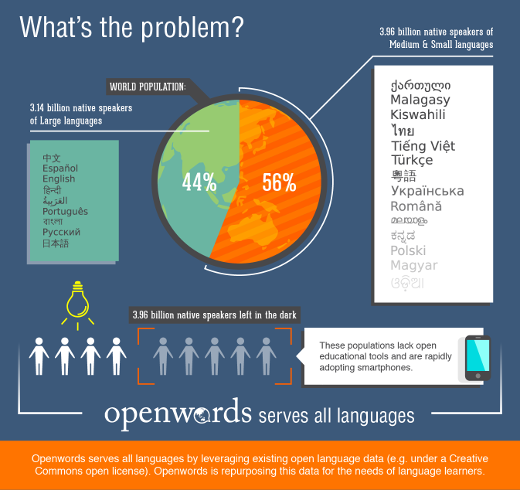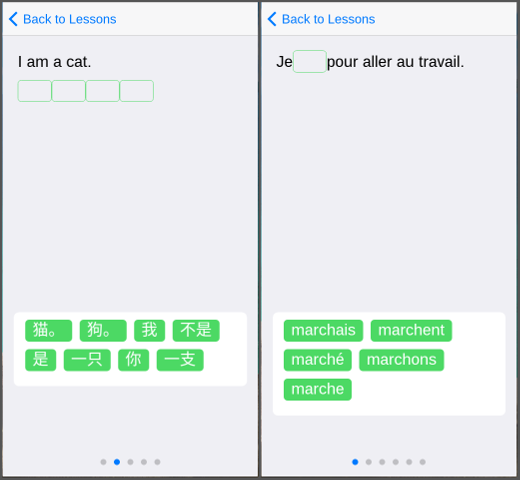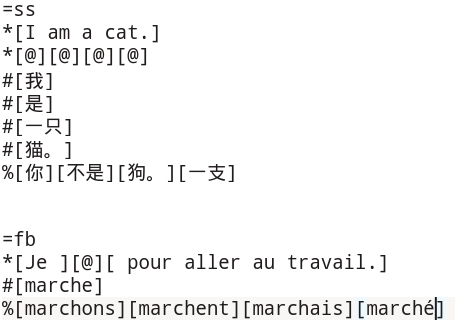[ad_1]
What is Openwords? Openwords is several things. It is an open source foreign language learning app. It is a customizable lesson builder for teachers. It is a social enterprise.
Languages without borders
Numerous language learning applications are emerging in the rapidly growing #EdTech field. However, many of these new applications aren’t committed to Open Educational Resources (OERs), which are openly-licensed educational materials. Charlie Reisinger’s article, Schools that #GoOpen should #GoOpenSource provides compelling reasons for OERs and open source in education.
Language learning educational resources are critical for a highly diverse planet that is increasingly interdependent. Both large and endangered language communities have unique needs. Additionally, there is an often overlooked group of medium-sized languages (30-100 million native speakers) that sum to roughly half the world’s population. Medium and smaller languages suffer from a lack of electronic language learning resources, and all instructors of languages of all sizes, large and small, may desire more control over their materials.
Openwords aims to address the concerns of large, medium, and small language communities using OERs and depending on international collaboration. A commitment to OERs facilitates international collaboration by ensuring everyone has a stake in the technology and curricula.

Customizable lesson builder and app
Openwords has two main components:
1) A cross-platform mobile/web app where individuals and students can take lessons composed of individual problems, inside or outside of the classroom. This app is being tested in classrooms this fall.
2) Openwords has created a lesson builder (and associated problem/lesson file format) where teachers can author problems and lessons to provide for their students. Since Openwords is open source, we’ve created an open format specifically for representing human language learning problems. This format is intended to be text-based, human-readable, and sufficient to the task of representing a wide variety of language learning problems. Developers or instructors could build lessons via our web-based lesson builder by directly editing the text of the lesson files, or by automatically generating large numbers of problems into the text-based format. The last method could be used by computational linguists and others with coding skills.
Here are two example problems. On the left is a simple sentence construction problem. On the right, a conjugation problem.

The image below shows the text file format representing the problems above; these problems can be typed or modified by hand, or by using the Openwords lesson builder. Teachers have control to creatively construct a wide variety of problems. We believe that making technology open source and transparent is key toward fostering the collaboration needed to generate OERs for both large and medium or small languages.

The first line of the code for a problem indicates the problem type. The first problem is a “simple sentence” problem. The second line indicates the problem to be displayed to the learner. The third line indicates the number of blanks for the answer, and subsequent lines provide the correct answers and finally, incorrect answers. Our code is designed to be flexible for future developments. For example, teachers may want students to recall and type the correct answer rather than to correctly arrange the sentence elements, and our format will allow this type of problem to be specified. Our code should also accommodate multiple correct answer configurations.
The Openwords app will be free and open source. Problem types within the Openwords app include sentence construction, conjugation, fill in the blank, multiple choice, simple review, hearing, and more. After multiple iterations, the Openwords web app is being tested in university classrooms this fall.
We’re actively looking for collaborating instructors, educators, administrators, and other allies. Sign up at Subscribe to Openwords, and we’ll keep you updated with major announcements. There are three major reasons you may want to follow our community: You may want to be an OER course developer or reviewer, you may wish to hear about the app release date, or you may want to be a donor in funding campaigns.
Education materials for the public
Finally, Openwords is a social enterprise. Openwords will build educational material as a public asset, a socially sustainable educational commons supported by responsible business models. Openwords will pursue some profit as an incentive to employee/shareholders and the founder (myself). However, profit maximization is neither the legal purpose, legal obligation, nor cultural interest of Openwords as an institution. For this reason we have the explicit goal of attaining B-corporation status. We believe genuine signals of cooperation are key toward generating lasting international collaborations.
Our team includes educators, linguists, designers, and programmers from all over the world (United States, China, South Korea, and more). And instructors are starting to work with us to build lessons.
In October I’m traveling to Baoding University in China. The purpose of the trip is to engage a wider community in open source and language learning OERs through Openwords. We’re interested in connecting with more groups around the world.
In order to build technology that global communities require, we’ll need to build deep relationships with these communities. Appropriately, Openwords is also starting relationships with social justice movements. Dr. Hugo Yu-Hsiu Lee is a researcher and social entrepreneur working in Southeast Asia (Taiwan, Thailand, and Bloomington, Indiana USA). Generally, Dr. Lee’s multiple non-profit organizations aim to research and bring linguistic justice to linguistically and economically disadvantaged learners, including refugees, orphans, and prostitutes. Dr. Lee is hosting a conference on teaching languages for social justice. Anyone interested should consider contacting Dr. Lee and joining the conference. Openwords will be there.
For more, see Linguistic Social Work: Teaching and Learning Languages for Social Inclusion on Facebook. And, you can follow Openwords on Facebook.
[ad_2]
Source link